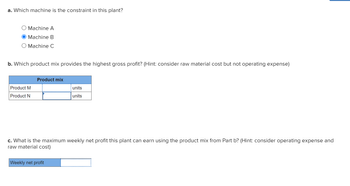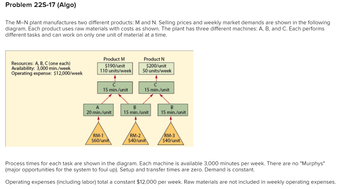
Practical Management Science
6th Edition
ISBN: 9781337406659
Author: WINSTON, Wayne L.
Publisher: Cengage,
expand_more
expand_more
format_list_bulleted
Question
Note:-
- Do not provide handwritten solution. Maintain accuracy and quality in your answer. Take care of plagiarism.
- Answer completely.
- You will get up vote for sure.

Transcribed Image Text:a. Which machine is the constraint in this plant?
O Machine A
O Machine B
O Machine C
b. Which product mix provides the highest gross profit? (Hint: consider raw material cost but not operating expense)
Product M
Product N
Product mix
units
units
c. What is the maximum weekly net profit this plant can earn using the product mix from Part b? (Hint: consider operating expense and
raw material cost)
Weekly net profit

Transcribed Image Text:Problem 22S-17 (Algo)
The M-N plant manufactures two different products: M and N. Selling prices and weekly market demands are shown in the following
diagram. Each product uses raw materials with costs as shown. The plant has three different machines: A, B, and C. Each performs
different tasks and can work on only one unit of material at a time.
Resources: A, B, C (one each)
Availability: 3,000 min./week
Operating expense: $12,000/week
Product M
$190/unit
110 units/week
15 min./unit
A
20 min./unit
RM-1
$60/unit
Product N
$200/unit
50 units/week
с
15 min./unit
B
15 min./unit
RM-2
$40/unit
B
15 min./unit
/RM-3
$40/unit
Process times for each task are shown in the diagram. Each machine is available 3,000 minutes per week. There are no "Murphys"
(major opportunities for the system to foul up). Setup and transfer times are zero. Demand is constant.
Operating expenses (including labor) total a constant $12,000 per week. Raw materials are not included in weekly operating expenses.
Expert Solution
This question has been solved!
Explore an expertly crafted, step-by-step solution for a thorough understanding of key concepts.
This is a popular solution
Trending nowThis is a popular solution!
Step by stepSolved in 5 steps with 7 images

Knowledge Booster
Similar questions
- Note:- Do not provide handwritten solution. Maintain accuracy and quality in your answer. Take care of plagiarism. Answer completely. You will get up vote for sure.arrow_forward13. Stare decisis is: Group of answer choices A. meant to provide predictability of legal outcomes B. the opposite of precedent C. Latin for "let the decision stand" D. Both A and Carrow_forwardLet start with client saying he went to buy an apple laptop Provide details about the product or service, including its features, benefits, and any unique selling points. The Salesperson will make the sales pitch, the Sales Supervisor will provide guidance and feedback, and the Client will interact as a potential buyer. In this scenario you should include sales techniques, sales issue related to ethics, and include empathy. Note:- Do not provide handwritten solution. Maintain accuracy and quality in your answer. Take care of plagiarism. Answer completely. You will get up vote for sure.arrow_forward
- A company's product can be either described as goods or services. Which of these statements is most correct? Group of answer choices Tangible goods are always easier to sell than services services might require more personal contact between providers and potential buyers services might require less personal contact between providers and potential buyers Services are always easier to market than tangible goodsarrow_forwardSubject - account Please help me. Thankyou.arrow_forwardTrue or False: The terms "gay", "transgender", and "queer" are adjectives (e.g. gay person, transgender person, queer person) and should never be used as nouns (a gay, a transgender, a queer). Group of answer choices True Falsearrow_forward
- 7) A type of qualitative research which uses a projective technique that requires the respon- dent to complete an incomplète stimulus situation is called: a. Completion technique b. Story completion c. Word association d. Sentence completionarrow_forwardNote:- Do not provide handwritten solution. Maintain accuracy and quality in your answer. Take care of plagiarism. Answer completely. You will get up vote for sure.arrow_forward12. If a question is open-ended it means it O provokes you to investigate can be answered with "yes" or "no" does not have just one, correct answer O sets the stage for actionarrow_forward
- To develop a well-researched report analyzing J. Richard Hackman's comment on using teams to complete complex projects, we will follow the 3x3 writing process, focusing on the prewriting phase. The first steps of the prewriting process include: 1. Understanding the Prompt: We will carefully read and comprehend Hackman's comment to ensure a clear understanding of his perspective on using teams for complex projects. 2. Gathering Information: We will conduct thorough research on Hackman's work, including reviewing his publications, scholarly articles, and any relevant studies or experiments he has conducted. This step will help us gather comprehensive information about his views on team effectiveness. 3. Organizing Ideas: Once we have gathered the necessary information, we will organize our thoughts and ideas in a structured manner. This will involve creating an outline that outlines the main points and arguments we want to address in the report. The purpose of this report is to…arrow_forwardPlease answer all of them I will leave a comment and a like. please im begging yoi ! QUESTION 23 ________ research is a nonscientific investigation. It is a method of gathering data that does not follow the scientific method and is typically subjective and exploratory. A. Content Analysis B. Academic Research C. Informal Research D. Formal Research QUESTION 24 ________is the extent to which a survey, test or measuring procedure yields the same results on repeated trials. A. Reliability B. Accuracy C. Validity D. Credibility QUESTION 25 The target of communications in Advertising is called a________ A. Market B. Public C. Bull’s-eye D. Audience QUESTION 26 A key INITIAL flaw in the Candyland research was that: A. The firm did not initially speak to members of the primary public B. The firm thought the colors…arrow_forwardNote:- Do not provide handwritten solution. Maintain accuracy and quality in your answer. Take care of plagiarism. Answer completely. You will get up vote for sure.arrow_forward
arrow_back_ios
SEE MORE QUESTIONS
arrow_forward_ios
Recommended textbooks for you
 Practical Management ScienceOperations ManagementISBN:9781337406659Author:WINSTON, Wayne L.Publisher:Cengage,
Practical Management ScienceOperations ManagementISBN:9781337406659Author:WINSTON, Wayne L.Publisher:Cengage, Operations ManagementOperations ManagementISBN:9781259667473Author:William J StevensonPublisher:McGraw-Hill Education
Operations ManagementOperations ManagementISBN:9781259667473Author:William J StevensonPublisher:McGraw-Hill Education Operations and Supply Chain Management (Mcgraw-hi...Operations ManagementISBN:9781259666100Author:F. Robert Jacobs, Richard B ChasePublisher:McGraw-Hill Education
Operations and Supply Chain Management (Mcgraw-hi...Operations ManagementISBN:9781259666100Author:F. Robert Jacobs, Richard B ChasePublisher:McGraw-Hill Education
 Purchasing and Supply Chain ManagementOperations ManagementISBN:9781285869681Author:Robert M. Monczka, Robert B. Handfield, Larry C. Giunipero, James L. PattersonPublisher:Cengage Learning
Purchasing and Supply Chain ManagementOperations ManagementISBN:9781285869681Author:Robert M. Monczka, Robert B. Handfield, Larry C. Giunipero, James L. PattersonPublisher:Cengage Learning Production and Operations Analysis, Seventh Editi...Operations ManagementISBN:9781478623069Author:Steven Nahmias, Tava Lennon OlsenPublisher:Waveland Press, Inc.
Production and Operations Analysis, Seventh Editi...Operations ManagementISBN:9781478623069Author:Steven Nahmias, Tava Lennon OlsenPublisher:Waveland Press, Inc.

Practical Management Science
Operations Management
ISBN:9781337406659
Author:WINSTON, Wayne L.
Publisher:Cengage,

Operations Management
Operations Management
ISBN:9781259667473
Author:William J Stevenson
Publisher:McGraw-Hill Education

Operations and Supply Chain Management (Mcgraw-hi...
Operations Management
ISBN:9781259666100
Author:F. Robert Jacobs, Richard B Chase
Publisher:McGraw-Hill Education


Purchasing and Supply Chain Management
Operations Management
ISBN:9781285869681
Author:Robert M. Monczka, Robert B. Handfield, Larry C. Giunipero, James L. Patterson
Publisher:Cengage Learning

Production and Operations Analysis, Seventh Editi...
Operations Management
ISBN:9781478623069
Author:Steven Nahmias, Tava Lennon Olsen
Publisher:Waveland Press, Inc.